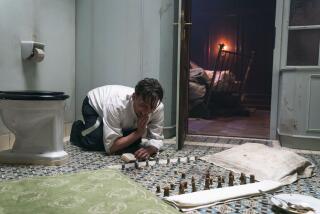Computer Knows the Right Moves, Is Master at Game of Chess
- Share via
PITTSBURGH — While two Soviet chess masters were playing a 72-match struggle over 14 months for the world championship, a souped-up chess computer was earning the elite rank of master in just five months of play and achieving the highest rating ever given a machine.
The electronic chess whiz is called Hitech, and it is capable of analyzing 175,000 moves per second, which its creators say is 50% faster than any other chess-playing machine. It beats other computers and holds its own against humans.
“It’s both smart and fast. It’s very, very strong in tactics and the ability to calculate sequences,” said Dr. Hans Berliner, a computer science professor at Carnegie-Mellon University who helped create Hitech.
“What sets it apart from other computers is we’re able to evaluate a position with a high degree of sophistication very, very quickly,” Berliner said. “I think we have a real chance to penetrate the very top levels. We’ll be in the top 50 players in the country by the end of next year.”
Hitech, three years in the making, won the first tournament it played May 25. By mid-October its record was 19-3-3. Berliner said the defeats came when it was new to competition.
In the grueling championship contest in the Soviet Union, Gary Kasparov finally defeated Anatoly Karpov earlier this month, making him the youngest chess champion in history at the age of 22.
On this side of the Atlantic this month, Hitech whipped two human masters at a local tournament and drew a third. It also established supremacy over all other machines by winning the North American Computer Chess Championship in Denver.
The victories earned Hitech the rank of master, based on a numerical formula that weighs won-lost records and the level of competition. Hitech’s ranking is about 2,250. The best human is near 2,800.
“Hitech is the highest rated computer we ever had,” said David Gertler of the U.S. Chess Federation and assistant editor of Chess Life magazine.
A computer named Belle was the first machine to earn the master’s rank in 1983, but it has since slipped to expert. Of 30,902 players rated by the U.S. Chess Federation, only 766 are masters and Hitech is the lone machine.
Berliner, himself a chess master, was once one of the nation’s top 12 players and played former world campion Bobby Fischer four times. He won the World Correspondence Chess Championship in 1968.
He sensed that Hitech was destined for greatness when it tied him recently.
“I took advantage of some things and got off to a good start. But according to it, I missed a chance to win. If you ask it, it will tell you what you should do,” said Berliner.
“I don’t think I’m going to be playing it much anymore. If it’s not better than me now, it will be in half a year.”
Researchers are continually refining its program, he said.
Berliner, 56, developed his first chess program while working for IBM. He left the company 16 years ago to get his doctorate in computer science at Carnegie-Mellon and stayed to continue work on the marriage of artificial intelligence and chess.
Hitech is actually a series of parallel computers. Each of the 64 squares on a chess board is governed by a microchip that is a computer in itself. Each microchip, containing the equivalent of thousands of transistors, identifies every move that can bring a chess piece onto its square, and a central arbiter evaluates each move and picks the best one.
A move is judged on whether it captures an opposing piece, puts a friendly piece in jeopardy and improves the control of the board.
“It’s more than just speed. We’re applying intelligence on many different levels,” Berliner said.
At most, a human considers about 200 possible chess moves based on experience and intuition. Hitech doggedly scans every possible move, even ones that might be ridiculous.
“We’re looking at an awful lot of trash. It looks at 30 million positions in about three minutes. But what if only 1% is worthwhile? That’s still 300,000 moves,” Berliner said.
Berliner said it will be 10 years before computers can compete with the likes of Kasparov.
More to Read
Sign up for Essential California
The most important California stories and recommendations in your inbox every morning.
You may occasionally receive promotional content from the Los Angeles Times.













